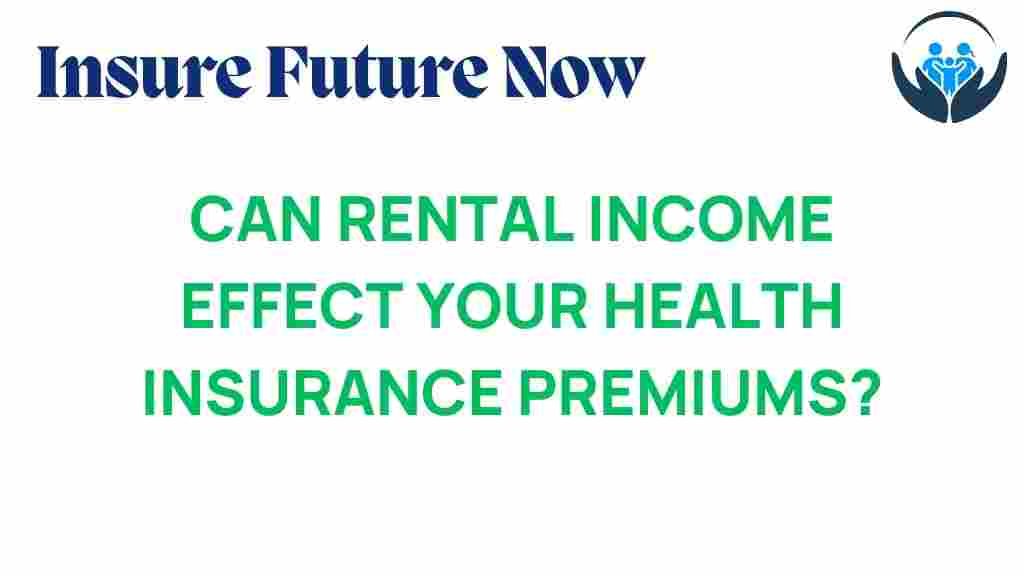Unraveling the Impact of Rental Income on Health Insurance Premiums
The intersection of rental income and health insurance premiums is a critical financial topic that many individuals overlook. As the costs of healthcare continue to rise, understanding how different income sources, particularly rental income, influence your insurance premiums can empower policyholders to make informed decisions. This article will delve into the financial impact that rental income has on health insurance premiums, explore the intricacies of policy evaluation, and provide insights into coverage options and affordability.
Understanding Rental Income and Its Financial Impact
Rental income refers to the earnings generated from leasing property to tenants. This income can significantly affect an individual’s financial profile and is considered an essential income source when evaluating health insurance premiums. But how does it actually impact your insurance costs?
The Role of Income in Health Insurance Premiums
Health insurance premiums are often determined by various factors, including:
- Your age
- Your health status
- Your income level
- The type of health insurance plan
When insurance companies assess your ability to pay premiums, they often look at your total income. This includes wages, investment returns, and rental income. If you have a consistent stream of rental income, it can enhance your financial standing, leading to potential benefits in premium calculations.
Effects of Rental Income on Premium Calculations
This section explores how different aspects of rental income can impact your health insurance premiums:
1. Increased Income Leading to Higher Premiums
In some cases, higher income levels can result in increased premiums. Since rental income is considered a source of income, it may push you into a higher income bracket, which could lead to higher health insurance costs. Insurers use income brackets to determine eligibility for subsidies and the premium rates you qualify for when purchasing health coverage.
2. Qualification for Subsidies
Many individuals rely on subsidies to reduce their health insurance costs. However, if your rental income is substantial, it may disqualify you from receiving these valuable subsidies, increasing your insurance costs overall. Here’s how it works:
- If your total income exceeds the federal poverty level (FPL), you may not qualify for premium tax credits.
- Rental income contributes to your total adjusted gross income (AGI), which is used to determine eligibility for subsidies.
3. Impact on Coverage Options
Higher income levels can also affect the type of coverage options available to you. Insurers may offer different plans based on income, which can either enhance or limit your choices. If you find yourself facing higher premiums due to increased rental income, it’s crucial to evaluate all available coverage options.
Steps to Evaluate the Impact of Rental Income on Your Health Insurance Premiums
To understand how rental income affects your health insurance premiums, follow these steps:
Step 1: Assess Your Total Income
Begin by calculating your total income, including:
- Salary or wages
- Rental income
- Investment income
This comprehensive assessment will give you a clear picture of where you stand financially.
Step 2: Review Your Health Insurance Policy
Next, take a close look at your current health insurance policy. Pay attention to:
- Your premium rates
- Your coverage options
- Any subsidies you are currently receiving
Step 3: Consult with an Insurance Agent
Discuss your financial situation with an insurance agent who can provide insights into how your rental income may impact your premiums. They can help you understand:
- Potential changes in premiums based on your income
- Alternative coverage options
- Strategies to optimize your health insurance costs
Step 4: Consider Tax Implications
Consider the tax implications of your rental income. Understanding how your income is taxed can help you make informed decisions about your health insurance premiums and overall financial strategy. Consult a tax professional if necessary.
Step 5: Reevaluate Annually
Your financial situation can change year-over-year, especially with fluctuations in rental income. Make it a point to reevaluate your health insurance policy annually to ensure you are getting the best coverage for your current financial state.
Troubleshooting Tips for Managing Health Insurance Costs
If you find that your rental income is significantly impacting your health insurance premiums, consider these troubleshooting tips:
1. Review Your Deductibles and Copays
Sometimes, adjusting your deductible or copay amounts can lead to lower overall premiums. Evaluate whether you can afford a higher deductible in exchange for lower premiums.
2. Compare Different Insurance Plans
Don’t settle for the first plan you find. Use online resources to compare different insurance plans and find one that fits your budget and coverage needs. Sites like HealthCare.gov can provide valuable information.
3. Explore Short-Term Insurance Options
If your rental income fluctuates significantly, consider short-term health insurance plans that offer flexibility and lower premiums. These plans may be suitable if you need coverage for a limited time.
4. Investigate Other Income Sources
Explore other income sources that might offer more favorable terms. If rental income is pushing your premiums higher, consider diversifying your income streams.
Conclusion
In conclusion, the relationship between rental income and health insurance premiums is nuanced and multifaceted. Understanding how your income sources affect your insurance costs is crucial for maintaining affordability and ensuring adequate coverage. By evaluating your financial situation, consulting with professionals, and exploring various coverage options, you can navigate the complexities of health insurance more effectively.
As you move forward, remember to keep an eye on your financial health and reassess your insurance needs regularly. The right approach can help you manage costs while ensuring you have the coverage you need. For more information on evaluating insurance options, check out this insurance evaluation guide.
This article is in the category Policies and created by InsureFutureNow Team
